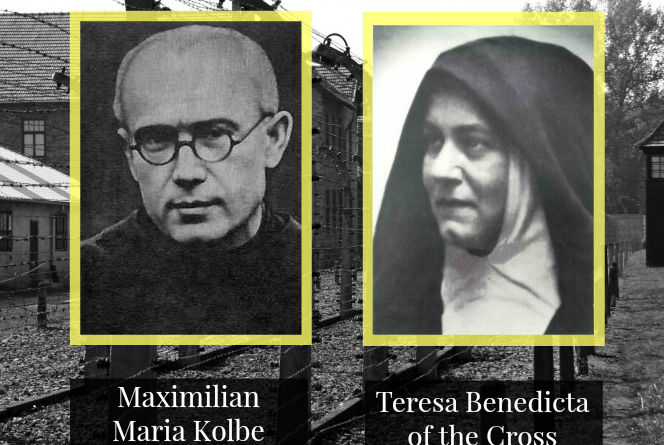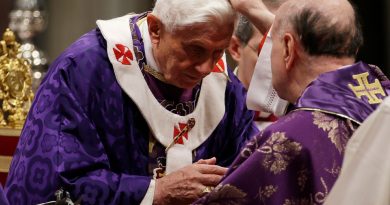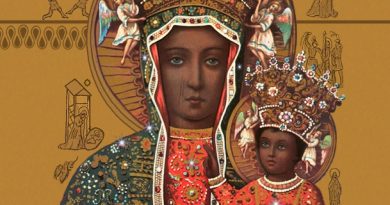The voices of the saints from the Holocaust
On January 27 the International Holocaust Remembrance Day is celebrated. This memorial day commemorates the Holocaust, the genocide of European Jews at the hands of Nazi Germany between the four-year period from 1941 till 1945. The reason why 27 January was chosen because this was the date when Auschwitz concentration camp was liberated by the Red Army in 1945.
In his appeal after the General Audience which centred on his catechesis on prayer, Pope Francis said: Today, the anniversary of the liberation of the Nazi Extermination Camp of Auschwitz, we celebrate International Holocaust Remembrance Day. We commemorate the victims of the Holocaust and all those persecuted and deported by the Nazi regime. Remembrance is an expression of humanity. Remembrance is a sign of civilization. To remember is a condition for a better future of peace and fraternity. Remembrance also means being careful because these things can happen again, starting with ideological proposals that are intended to save a people and end up destroying a people and humanity. Be aware of how this road of death, extermination and brutality began.
If remembrance is equivalent to humanity, civilization, helping to make peace and fraternity possible, being on the guard lest these things happen again, it is also remembering people whose holy life resisted extermination and brutality. Two people whose holiness really shine amid the horror of the Holocaust are St. Maximillian Kolbe and St Teresa Benedicta of the Cross.
Maximillian Kolbe, whose original name was Rajmund Kolbe who was born on January 8, 1894, was a Franciscan Conventual priest and a great devotee of the Virgin Mary, who gave his life to save the life of a family man. He was martyred by the Nazis on August 14, 1941. He was beatified on October 17, 1971 by St Pope Paul VI and canonized by St Pope John Paul II on October 10, 1982. Here is some of the great spiritual heritage he left us as a gift to model our life on God.
In front of indifference, which is the most deadly poison of today’s world, let us praise God with all our strength. He wrote: The most deadly poison of our times is indifference. And this happens, although the praise of God should know no limits. Let us strive, therefore, to praise Him to the greatest extent of our powers. For Jesus St Maximillian was ready to die. He said: For Jesus Christ I am prepared to suffer still more. Real victories occur inside us when let God’s holiness prevail on our sinfulness. No one in the world can change Truth. What we can do and should do is to seek truth and to serve it when we have found it. The real conflict is the inner conflict. Beyond armies of occupation and the hecatombs [e.g. the sacrifice of many victims] of extermination camps, there are two irreconcilable enemies in the depth of every soul: good and evil, sin and love. And what use are the victories on the battlefield if we ourselves are defeated in our innermost personal selves?
St Maximillian teaches us that Jesus and Mary are inseparable. If anyone does not wish to have Mary Immaculate for his Mother, he will not have Christ for his Brother. The Immaculada’s powerful intercession is beyond compare. Prayer is powerful beyond limits when we turn to the Immaculata who is queen even of God’s heart. Kolbe’s love for the Eucharistic Jesus made him long to institute perpetual adoration. My aim is to institute perpetual adoration, he said, for this is the “the most important activity” and “if half of the Brothers would work, and the other half pray, this would not require too much.”
He considered the whole world as Niepokalanow, that is the Niepokalanów monastery, also called City of the Immaculate Mother of God. This is a religious community in Teresin, situated some 42 km to the west from Warsaw, Poland, and founded in 1927 by St Maximillian himself. The whole world is a large Niepokalanow where the Father is God, the mother the Immaculata, the elder brother the Lord Jesus in all the tabernacles of the world, and the younger brothers the people. In another thought he commented thus on the Niepokalanow: Niepokalanow is a home like Nazareth. The Father is God the Father, the mother and mistress of the home is the Immaculata, the firstborn son and our brother is Jesus in the most Holy Sacrament of the altar. All the younger brothers try to imitate the elder Brother in love and honor towards God and the Immaculata, our common parents, and from the Immaculata they try to love the divine elder Brother, the ideal of sanctity who deigned to come down from heaven to be incarnated in her and to live with us in the tabernacle…
St Maximillian talks about his mystical experience when Our Lady presented to him with two crowns, the white and the read crown. As the story goes, St Maximillian chose them both. That night, I asked the Mother of God what was to become of me, a Child of Faith. Then she came to me holding two crowns, one white, the other red. She asked me if I was willing to accept either of these crowns. The white one meant that I should persevere in purity, and the red that I should become a martyr. I said that I would accept them both.
If we cooperate with the Immaculada by consecrating ourselves to her the defeat of Satan is complete. Modern times are dominated by Satan and will be more so in the future. The conflict with hell cannot be engaged by men, even the most clever. The Immaculata alone has from God the promise of victory over Satan. However, assumed into Heaven, the Mother of God now requires our cooperation. She seeks souls who will consecrate themselves entirely to her, who will become in her hands effective instruments for the defeat of Satan and the spreading of God’s kingdom upon earth. In another reflection St Maximillian delved deeper into our consecration to Mary. He encourages us: Let us give ourselves to the Immaculata [Mary]. Let her prepare us, let her receive Him [Jesus] in Holy Communion. This is the manner most perfect and pleasing to the Lord Jesus and brings great fruit to us.” Because “the Immaculata knows the secret, how to unite ourselves totally with the heart of the Lord Jesus… We do not limit ourselves in love. We want to love the Lord Jesus with her heart, or rather that she would love the Lord with our heart.”
The other holy voice that we encounter in the Holocaust is that of Edith Stein or St Teresa Benedicta of the Cross. She was born on October 12, 1891, in Breslau Germany. After converting from Judaism she became a Carmelite nun and was executed by the Nazis due to her Jewish ancestry on 9/10 August 1942. She was beatified on May 1, 1987 and canonized on October 11, 1998 by St Pope John Paul II. Let us now taste the spiritual patrimony of this great mystic, philosopher and spiritual writer.
On Motherhood Edith writes: To be a mother is to nourish and protect true humanity and bring it to development. If you are seeking the truth here is her advice for you: Anyone who seeks truth seeks God, whether or not he realizes it. My longing for truth was a single prayer. In life being is more important than doing. She said: The world doesn’t need what women have, it needs what women are. St Teresa Benedicta reflected on the Imago Dei and human will: In order to be an image of God, the spirit must turn to what is eternal, hold it in spirit, keep it in memory, and by loving it, embrace it in the will.
Regarding the infinite diversity and splendor of God’s creativity Edith observes: Each finite creature can reflect only a fraction of the divine nature; thus, in the diversity of His creatures, God’s infinity, unity and oneness appear to be broken into an effulfgence of manifold rays. Moreover, there is a close relationship between Truth and Love: Do not accept anything as the truth if it lacks love. And do not accept anything as love which lacks truth!
St Teresa Benedetta also speaks about the human responsibility to defend the true and the good. She says: Those who remain silent are responsible. Being a great feminine genius Edith also gave a very rich definition of the woman’s vocation in our world. The soul of woman must be expansive and open to all human beings, it must be quiet so that no small weak flame will be extinguished by stormy winds; warm so as not to benumb fragile buds … empty of itself, in order that extraneous life may have room in it; finally, mistress of itself and also of its body, so that the entire person is readily at the disposal of every call. Thus, the vocation of women can be described in the following way: Each woman who lives in the light of eternity can fulfill her vocation no matter if it is in marriage, in a religious order or in a worldly profession. In her writings St Teresa Benedicta celebrated the maternal instincts a woman has. Woman naturally seeks to embrace that which is living, personal, and whole. To cherish, guard, protect, nourish and advance growth is her natural, maternal yearning. Mary is the woman that each girl is to imitate. Since Mary is the prototype of pure womanhood, the imitation of Mary must be the goal of girls’ education. In a nutshell, in this troubling world, there is an ongoing human need for mothers. She says: Everywhere the need exists for maternal sympathy and help…
As a Carmelite contemplative she could not bypass a sound reflection of what religious life is all about. The motive, principle, and end of the religious life is to make an absolute gift of self to God in a self-forgetting love, to end one’s own life in order to make room for God’s life. On authentic Christian discipleship Edith has this to say: The deeper one is drawn into God, the more one must ‘go out of oneself’; that is, one must go to the world in order to carry the divine life into it.
What about prayer and the use of time? St Teresa Benedicta says: Let go of your plans. The first hour of your morning belongs to God. Tackle the day’s work that He charges you with and He will give you the power to accomplish it. In God’s eyes every detail of our lives makes sense. I am coming to the living faith and conviction that—from God’s point of view—there is no chance and that the whole of my life, down to every detail, has been mapped out in God’s divine providence and makes complete and perfect sense in God’s all-seeing eyes.
That is why it is wise to surrender to God on a daily basis. Edith gives us this subsequent advice: And when night comes, and you look back over the day and see how fragmentary everything has been, and how much you planned that has gone undone, and all the reasons you have to be embarrassed and ashamed: just take everything exactly as it is, put it in God’s hands and leave it with Him.
The voices of St Maximillian Kolbe and St Teresa Benedicta of the Cross, together with the voices of other countless people, show that God is always triumphant over evil. Even if this evil is so cruel and horrendous like that of the Holocaust!
Fr Mario Attard OFM Cap





